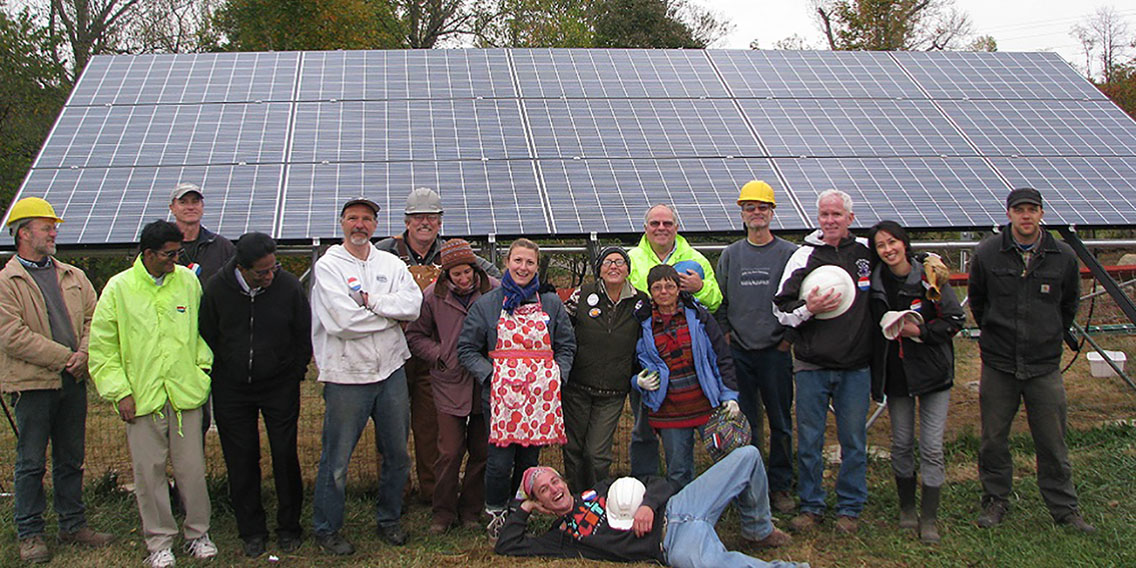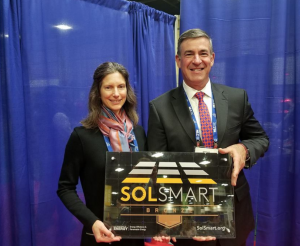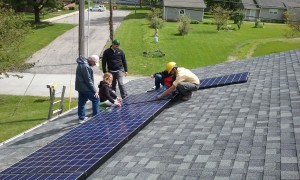
A New Sun Rises for Athens’ Solar Community
By: Lily Bradley
Posted on:
Renewable energy, specifically solar, is more accessible and affordable than ever. Since 2008, the cost of utility-scale solar projects has decreased by nearly 70 percent, and the cost of distributed rooftop arrays has been reduced by more than 50 percent. The low costs and small carbon footprint are starting to steer communities toward these renewable energy sources. One region leading that charge is Southeast Ohio.
The solar-friendly city of Athens
“We should be extremely conscious to how we look at the city we’re leaving behind to the next generation. We’re always evolving and doing better and I think as the city of Athens, that’s part of our charge,” Athens City Mayor Steve Patterson said.

Mayor Patterson is Vice-Chair of the Southeast Ohio Public Energy Council, or SOPEC. The council’s mission is to provide communities opportunities to find cheaper and cleaner alternative energy plans in order to “save hundreds of dollars for homes and small businesses, and thousands for small governments,” according to its website.
Just last year, all four of SOPEC’s community partners, including Athens, received national bronze recognition from the SolSmart program for their dedication to making their communities solar friendly. The United States Department of Energy funds the SolSmart Recognition Program, which includes allocating grant money to communities for solar energy projects.
“We looked at ways in which we can better streamline solar in the residential neighborhoods and we were able to make a few changes,” Patterson said. “Our goal is to eventually become a silver level city.”
Energy consumption has been a top priority of the city for years, according to Athens City Planner Paul Logue. Among all 88 counties in Ohio, Athens has the most solar installations per capita.
“Energy is really important because we, as a community, are concerned about our carbon emission within our environment,” Logue said.
Logue believes Athens is the perfect city to undertake solar initiatives because of its abundance of solar exposure. “We have solar exposure here in Athens about as good as anywhere else in the world.”

According to Logue, Athens has a solar exposure of about 85 percent which is only fifteen percentage points less than Miami.
Last month, Athens City Council unanimously approved a plan to place an opt-out carbon tax on the ballot for voters this May. The new program would use that money to invest in renewable sources, which would include the installation of solar-energy systems on city and local buildings, according to Upgrade Ohio’s Matthew Roberts. One of the possible locations to receive solar panels is the parking garage on Washington Street.
“We’re asking people, ‘Would you like to add a little bit of charge–the price of a extra coffee–to help build solar in your community?’ We believe that people really want to do that and we believe that this community is ready for this challenge,” said Roberts.
Upgrade Ohio is one of SOPEC’s partners. The organization aims to connect communities and people with local resources to reduce harmful energy use.
Mayor Patterson believes the work he is doing with SOPEC and Upgrade Ohio is important and beneficial.

“We’re always thinking about different ways to drive down our carbon footprint while driving down our energy cost.”
An overview of solar energy
Solar panels produce electric currents when exposed to daylight. The current is then passed through a device called an inverter. Ultimately, it’s the inverter that enables you to power your home, business or school.
When the system makes more power than needed, the excess energy goes out to the utility grid for a credit.
Currently renewable energy sources supply more than two percent of Ohio’s net electricity generation and more than 164 mega watts of solar energy have been installed across the state. Yet solar only accounts .2 percent of the state’s overall electricity production.
The Federal Hocking solar project
Federal Hocking High School and Middle School will be the site of the next big solar project in Athens County. The plans are part of the Solar ACESS project, which is an initiative led by Upgrade Ohi0.
Federal Hocking Superintendent George Wood believes the economic benefits will be tremendous.
“We’ll be able to buy power cheaper and at the end of the agreement we can actually own the power plant if we want. Then we can buy power for nothing. So, it creates big savings for the district,” said Wood.
Wood also thinks that this project will provide huge educational benefits for the students.
“We take a lot in this country about multiple energy sources, you know, getting energy from multiple places, for granted. [The project] gives them a first hand experience with other ways of generating and sustaining electrical power. It will also be kind of a hands-on learning experience for our kids,” added Wood.
The project is set to start within the coming months. The installation process will take around 18 months to complete. The company installing the solar arrays is Third Sun Solar, an Athens-based company. Third Sun is one of four solar companies in Athens, and 268 in the state.
“If you look at the per capita solar ownership, Athens County is the highest in the state. Which is fantastic,” said Third Sun Solar Founder and President Geoff Greenfield.
Greenfield believes that, above all else, the biggest benefit of the growing clean energy trend in the region is the jobs it is creating.
“Clean energy employs more people than Google and Apple combined. I think people are blown away by that.”

